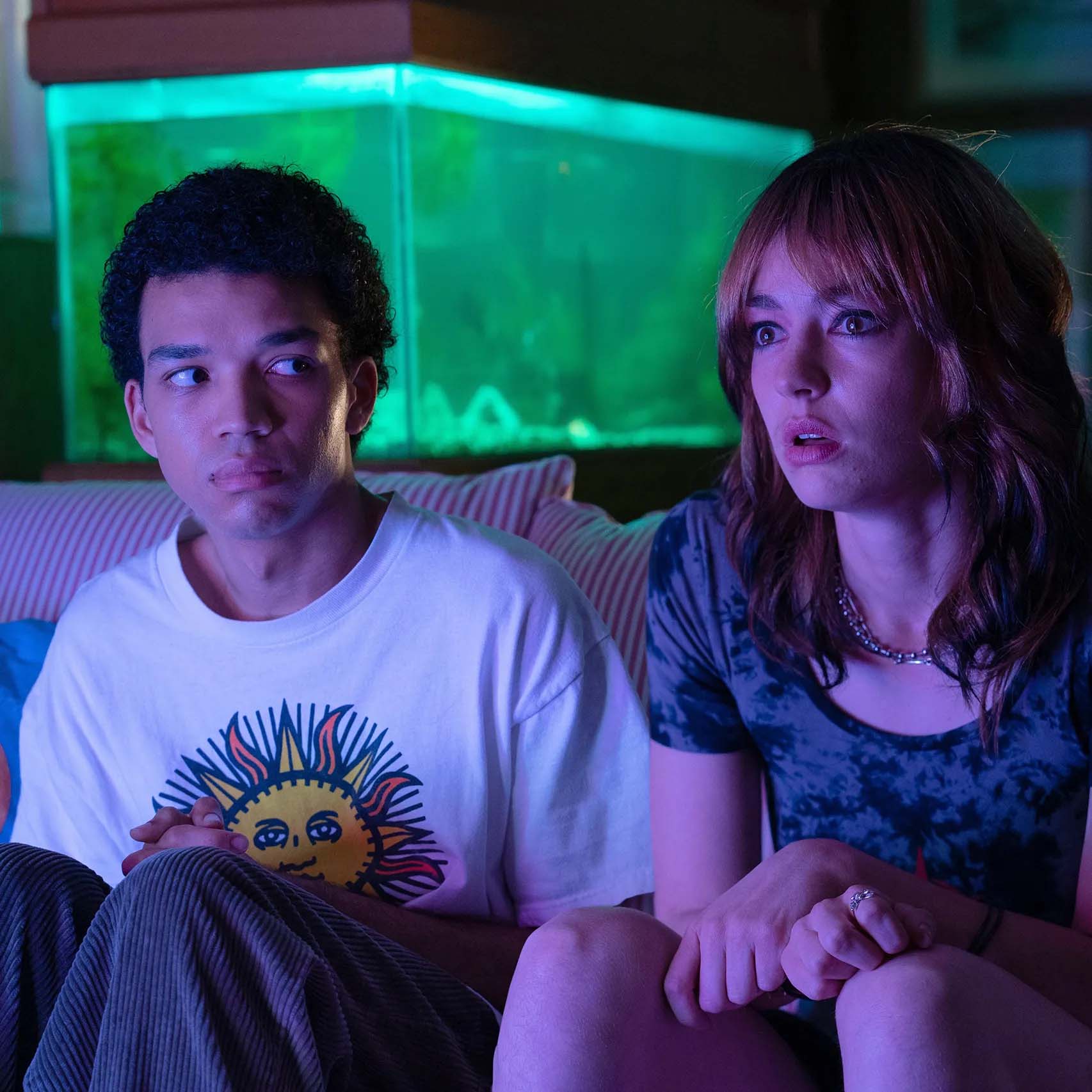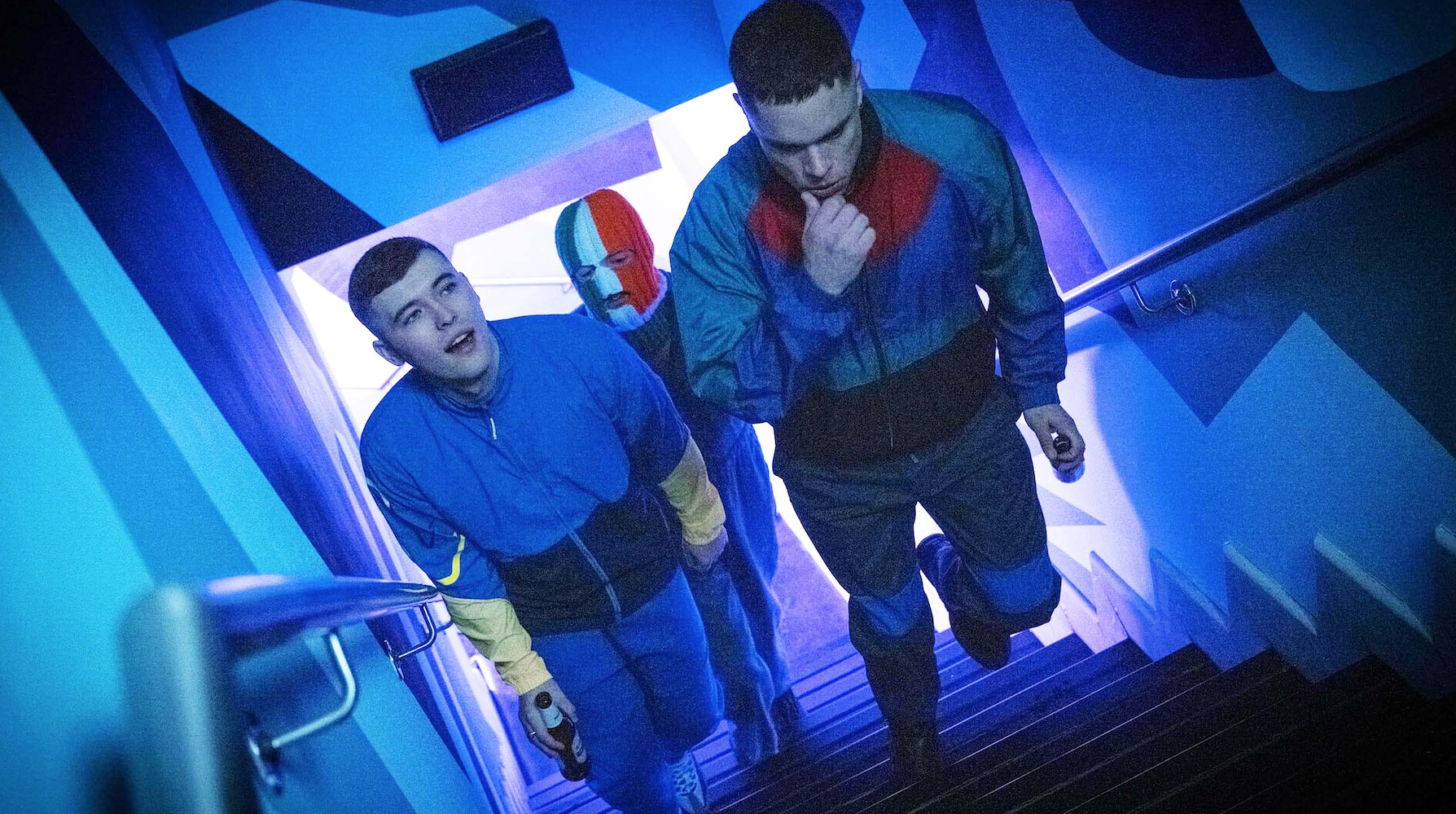Roe McDermott selects her top ten movies of 2024.
1. The Zone Of Interest
Jonathan Glazer’s The Zone Of Interest is a chilling meditation on the banality of evil, a haunting exploration of the Holocaust from an unsettlingly intimate perspective. Based on Martin Amis’ novel, the film focuses on Rudolf Höss (Christian Friedel), the commandant of Auschwitz, and his family, who live in a dream home just yards from the horrors of the concentration camp. Glazer’s bold decision to depict this story through the lens of the perpetrators, rather than the victims, creates a dissonance that is both unnerving and thought-provoking.
The film’s cold, meticulous framing mirrors the emotional distance of the Höss family, who continue their bourgeois, seemingly normal lives while genocide unfolds just beyond their walls. Through sound and visual cues, Glazer draws a powerful contrast between the domestic comforts of the Höss home and the atrocities just outside.
The subtle, horrifying detail – the children playing with stolen gold teeth, a Jewish victim’s lipstick purloined and used, the family’s casual proximity to murder – are made all the more disturbing by the sterilised way they are portrayed in Glazer’s unforgettable film.
2. All Of Us Strangers
Advertisement
Andrew Haigh’s All Of Us Strangers weaves a haunting, otherworldly atmosphere from its opening moments, where golden light pours through the windows of an eerie, almost desolate apartment building. The building feels untethered from time, inhabited by only two residents – Adam (Andrew Scott) and Harry (Paul Mescal) – setting the stage for a tale where the supernatural is palpable, yet intimately human.
Haigh’s trademark exploration of relationships and intimacy takes a fantastical turn as Adam, a screenwriter struggling with grief, begins revisiting the house of his deceased parents, who have mysteriously returned to the age they were when they died. Based loosely on Taichi Yamada’s 1987 novel Strangers, the film is a delicate meditation on loss, generational trauma, and the longing for connection.
The performances are extraordinary, and Haigh’s careful direction and minimalistic approach make All Of Us Strangers an emotionally rich exploration of love, grief and the need for closure.
3. Poor Things
Yorgos Lanthimos’ Poor Things is a deliriously bizarre odyssey that blends the grotesque with the whimsical, marking the director’s most thrilling and audacious work to date. Set in Victorian London, the film centres on Bella Baxter (Emma Stone), a young woman brought back to life by a mad scientist, Dr. Godwin Baxter (Willem Dafoe).
Advertisement
Initially behaving like a toddler, Bella embarks on a journey of self-discovery and sexual liberation, navigating a world of eccentric characters and absurd situations, from passionate affairs to an eye-opening world tour. The film is a visual feast, with cinematography by Robbie Ryan that transforms from grainy black-and-white to lush colour, symbolising Bella’s growth. Lanthimos’ signature style – depicting extreme behaviours in pristine settings – is on full display, creating a world where decorum and chaos collide.
The screenplay, adapted by Tony McNamara, crackles with sharp, rhythmic dialogue, reflecting Bella’s intellectual blossoming as she breaks free from patriarchal control. Exquisite costume and production design further enrich the film’s surreal world, making Poor Things a visually stunning exploration of identity, freedom and transformation.
4. The Substance
A daring, audacious and darkly funny exploration of misogyny and ageism against women, Coralie Fargeat’s body horror The Substance stars Demi Moore, in a role that references her own struggles with having her age and appearance decimated by the media over her career.
Moore plays Elisabeth Sparkle, a Hollywood actress-turned-aerobics workout host, who is breathtakingly beautiful – but she’s over 50, which to network managers, makes her irrelevant.
Elisabeth fears fading into obscurity and takes some desperate measures in the form of The Substance, a neon-green, injectable body enhancement programme that births a more perfect version of herself – ie. younger, tauter and slimmer. The two must trade off every week, but when the young replacement Sue (Maragaret Qualley) starts rebelling, things go disgustingly, horrifically wrong.
The rivalry between Elisabeth and Sue has echoes of Showgirls, and there’s a camp, late ’80s flair to the styling, which is all neon spandex and coiffed hair. And the body horror is wonderfully, outrageously grotesque, with grisly violence, and an audacious final act that is monstrous and hilarious in equal measure.
Advertisement
5. I Saw The TV Glow
Queer filmmaker Jane Schoenbrun directs this incredible film that exists between reality, dreams and nightmares, using ’90s nostalgia to capture the struggle of two characters desperately trying to survive Don’t Ask, Don’t Tell-era American suburbia. While holding a powerful trans allegory, all fans of cinema should appreciate the beauty, artistry and deep emotion of I Saw The TV Glow.
Students Maddy and Owen feel unable to find recognition in the people around them, and instead gravitate towards Pink Opaque, a kitschy and unnerving TV show in the vein of Buffy, Goosebumps and Are You Afraid Of The Dark? Shot in flared neon where pauses are long, fantastical imagery flashes, details are slightly off and TV static sometimes radiates from Maddy and Owen’s bodies, I Saw The TV Glow sinks its teeth into your subconscious.
Haunting, beautiful, audacious and utterly intoxicating, I Saw The TV Glow will suck you right in.

I Saw The TV Glow
6. Anora
Advertisement
Sean Baker’s Anora is a spirited, emotional rollercoaster that captures the gritty heart of New York City, blending comedy with the raw edges of tragedy in a way only he can. At first glance, the film plays out like an uproarious screwball comedy, filled with vibrant set-pieces and wise-cracking characters.
But beneath its playful surface lies a chilling examination of survival, class and exploitation. Mikey Madison stars as Ani (short for Anora), a Russian-American escort who navigates her life with resilience and humour. Initially, she’s content with her transactional relationships, until she meets Ivan (Mark Eydelshteyn), the charming motormouth son of a Russian oligarch. Their whirlwind romance, full of extravagant shopping sprees and lavish parties, eventually turns darker when Ivan’s family forces their marriage into jeopardy.
Baker’s expert direction and exquisite casting shine, especially with Madison’s commanding performance. She brings Ani to life with a mix of toughness and vulnerability, embodying the complexity of a woman who refuses to be a victim. Anora is both thrilling and heartbreaking, a film that hums with the energy of life, while never ignoring the profound sadness lurking beneath.
7. KNEECAP
I’m quite sure that we’ve never before seen a film inspired by Northern Ireland’s Identity and Language Act 2022, but Rich Peppiatt’s fictionalised biopic Kneecap takes this legislation and creates a kinetic, outrageous, hedonistic exploration of language, identity and political complexity.
Naoise Ó Cairealláin and Liam Óg Ó Hannaidh play Móglaí Bap and Mo Chara, two small-time drug dealers in post-ceasefire Belfast, who join forces with a local Irish teacher (JJ Ó Dochartaigh) and start performing together. Their gigs are, at first, embarrassingly small. But as their raps about drugs, sex and the police spread, fans start turning up to the increasingly raucous shows, chanting in Irish about the society around them. The film is layered with complexity about everyday life for the Ceasefire Babies of West Belfast.
While Móglaí Bap and Mo Chara throw around phrases like “intergenerational trauma” cynically to score ADHD medication, the ripples of past violence are felt in the daily tensions, confrontations and purposelessness of young people. These narrative threads and hard realities are intriguingly dropped into the self-mythologising narrative, which moves at a breakneck pace.
Advertisement
Watch, laugh, enjoy, rewind, repeat – and try to keep up. Kneecap are going places, and won’t slow down for you.

KNEECAP
8. Don’t Forget To Remember
The pain, power and possibility of forgetting is explored in Ross Killeen’s beautiful new film, Don’t Forget To Remember, which explores the relationship between artist Abestos and his mother Helena, who has Alzheimer’s.
Abestos admits that his role as an artist means he both experiences his mother’s forgetting while also observing it, processing her condition and their switched role of carer/cared-for through his art – which thankfully, is still a source of connection for mother and son.
Abestos also complicates our understanding of her forgetting by noting its small, strange beauty at times, and how it allows Helena to be free from a lot of her old trauma and anxiety. This isn’t presented as, or expected to be, a consolation, of course, but highlights Abestos’ ability to see both the mother he always knew, and her new way of existing, and the difference in those identities. Abestos’ art evokes these ideas, as the artist creates intricate collages to show the nature of memory.
Advertisement
A stunning film. Go, watch, and call your Mam.
9. Conclave
Conclave, directed by Edward Berger, is a gripping and smart political drama set within the Vatican’s sacred walls, where the College of Cardinals convenes to select the next Pope. The film pulses with electricity, fuelled by razor-sharp dialogue, strong performances, and a plot full of unexpected twists that keep the audience on edge.
While exploring the intricacies of this ancient, mysterious process, Conclave delves into the universal themes of ambition, manipulation, and the internal struggles between tradition and progress that resonate far beyond the Vatican. Ralph Fiennes shines as Cardinal Lawrence, the Dean presiding over the election, grappling with his doubts and the heavy responsibility thrust upon him.
The diverse cast, including Stanley Tucci as the liberal Cardinal Bellini, John Lithgow as a scheming candidate, and Lucian Msamati as an African bishop with a hidden past, create a compelling ensemble, where every character’s ambitions, weaknesses and secrets come to the forefront.
Conclave is a thrilling and provocative film that pulls you into its labyrinth of intrigue, and leaves you reflecting on the nature of power and faith long after the credits roll.
10. That They May Face The Rising Sun
Advertisement
Pat Collins is one of Ireland’s most prolific and thoughtful directors, having made over 30 films in the past two decades. His work is known for its meditative tone and invitation to the viewer to slow down, pay attention, and relish the beauty of everyday details – making him the ideal director to adapt John McGahern’s 2002 novel, That They May Face The Rising Sun.
Barry Ward and Anna Bederke play Joe, a writer, and Anna, an artist. Having left London five years previously, they live a life of quiet contentment in ’80s Ireland, appreciating the beauty of their surroundings. But in the lives of the older neighbours around them, there are struggles and conflicts, mainly caused by poverty, loneliness and generational traumas.
The sense of time passing is shown in Collin’s delicate pacing; Anna’s learning of disappearing skills such as weaving and separating wool; and how older neighbours such as the volatile Patrick (Lalor Roddy) struggle against how the world is changing around him – and perhaps leaving him behind. Beautifully paced and performed, this gentle but thought-provoking film has real depth.

That They May Face The Rising Sun
Advertisement
This post was originally published on here







